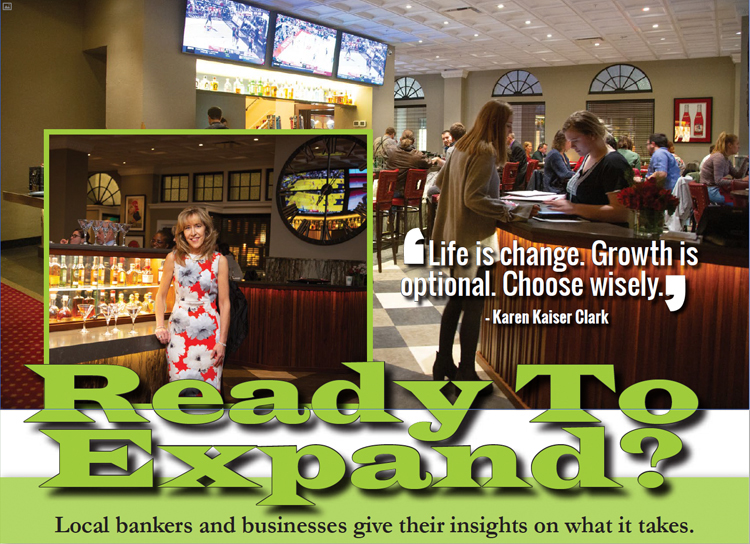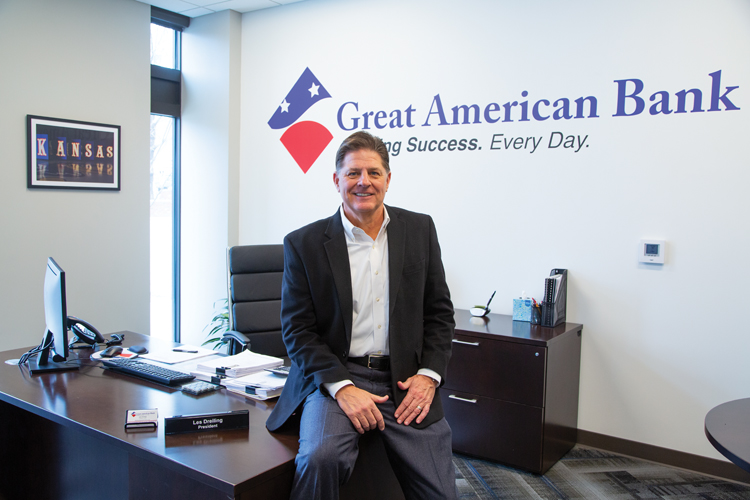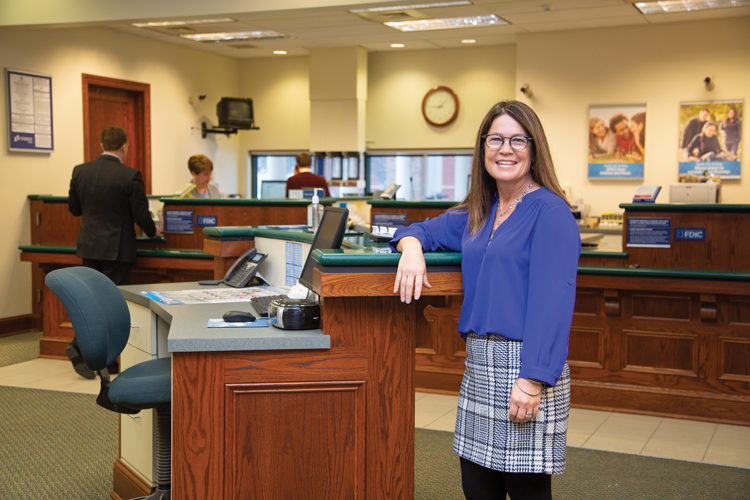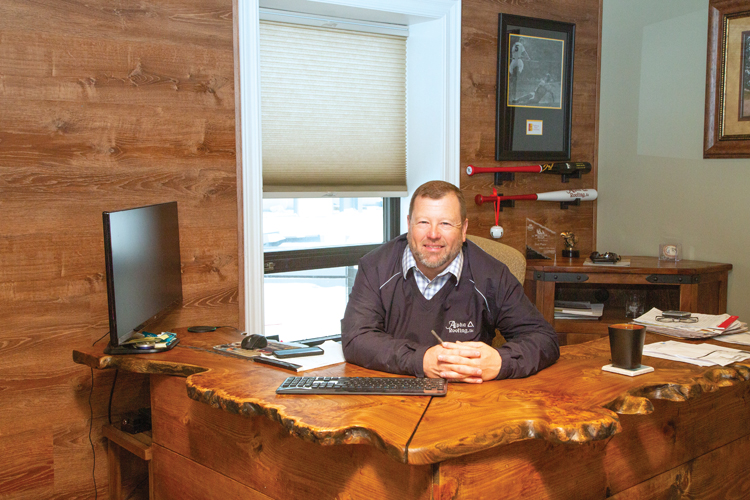Local bankers and businesses give their insights on what it takes.
| 2019 Q1 | story by Liz Weslander | photos by Steven Hertzog

Nancy Longhurst, General Manager, The Olivia Collection at the newly de-signed and renovated Jayhawker bar at the Eldridge Hotel on Mass Street
When it comes to expanding your business, cash is king, realistic goals are essential and a strong team will take you far. These are just a few nuggets of wisdom that local bankers and businesspeople have for anyone considering expanding their business. Read on for more insights from local experts.
Advice From Bankers

Les J. Dreiling, President and Chief Executive Officer at Great American Bank
While the basic first step when applying for a business-expansion loan is to present your recent tax returns and financial statements from the past few years, getting a loan requires a lot more than simply having your financial papers in order. When considering a loan, banks want to work with companies that have done their research. They’re looking for a complete picture of the whats and whys of the expansion, as well as some realistic ideas of how the company plans to pull it off.
“The key question is what is the purpose of the loan, and the next question is how are you going to pay that money back,” says Les Dreiling, president and chief executive officer of Great American Bank, 888 New Hampshire St. “You’ll want to do a two-year financial map with month-to-month cash flow projections. You don’t want to be overly optimistic or pessimistic, just give a realistic look at projections.”
Beth Easter, commercial relationship manager at INTRUST Bank, 901 Vermont St., says that in addition to solid research, business owners looking to expand should ideally come to the bank with some cash to put on the table.
“Most bankers will talk about you needing to have some skin in the game, so usually if there is an expansion of some sort, then we would recommend that a business owner would also contribute 20 to 30 percent of their own cash toward that expansion,” Easter says.
The absence of a realistic plan and a lack of cash reserves are often signs that a business is not currently in a position to expand, Dreiling and Easter agree.
Dreiling says business owners will sometimes maintain they would not need to borrow money if they had excess cash, but a major pitfall he sees with expanding businesses is when they go in with overly optimistic projections and not enough cash to deal with unforeseen obstacles.
“You don’t want to go into expansion when you are heavily in debt and don’t have any liquidity should the expansion take longer than you thought,” Dreiling says.

Beth Easter, Intrust Bank, Commercial Relationship Manager .
Easter says that because businesses often have large amounts of cash when first starting out, she will sometimes advise new business owners to set aside some of their start-up cash to use as collateral for a line of credit.
“That way they don’t put all their eggs in one basket,” she explains. “They may not ever use the line of credit if everything in the business goes exactly as planned, but if they do need it, it’s already in place. It’s not ideal to be coming to the bank to establish a line of credit when you’re out of cash.”
Having an established relationship with a bank is also nice, because it provides an opportunity for a business owner to talk regularly with the bank about future plans, which makes it easier to be both realistic and proactive about what they need to have in place when they are ready to expand.
“It really helps if a business can come in and talk with us before they need money,” Easter says. “When they are asking questions like ‘What should my cash flow be?’ and ‘What should I be able to show you at the end of the year if I want to expand?’, it helps everyone set expectations from the beginning.”
While Dreiling often works with businesses with which he has an established relationship, he says business owners looking to expand will sometimes come to Great American Bank because they are not getting what they need from larger banks.
“Sometimes we will get someone who has been banking with a big bank, and maybe the big bank isn’t into the $300,000 loan or what have you, so as a community bank, we can pick up a niche that way,” Dreiling says. “We know the community, and sometimes it helps to deal with a community banker versus an out-of-town bank in North Dakota or St. Louis.”

Darin Lutz, owner of Alpha Roofing in his office at his desk.
Success-Story Wisdom
Darin Lutz, owner of the residential and commercial roofing outfit Alpha Roofing, knows firsthand the many factors that go into growing a business. When he started the company is 2005, it was just Lutz working with one crew, while his wife did books out of their home. When a hailstorm tore through Lawrence in 2006, he had no choice but to expand.
“That’s pretty much what expedited Alpha Roofing’s footprint in Lawrence,” Lutz says. “We went from $500,000 in revenue to $3 million in the second year of business. I had to add people right then and there to handle the workload.”
Although circumstances beyond Lutz’s control jump-started Alpha Roofing’s expansion, Lutz says he is a big believer in slow growth.
One of the first people he hired was operations manager Yvonne Ruder, who took on handling the financial end of the company. Lutz says Ruder has been a key collaborator in steadily growing the company.
“I’m a slow-growth guy. For me to hire someone is a big deal,” Lutz explains. “I don’t just grab warm bodies because we need them. There’s lots of discussion and number-crunching before we add someone. Even though the need might be immediate, it’s just not something we jump into.”
Alpha Roofing currently has 12 in-house employees and recently moved into a larger office building. It now does business throughout northeast Kansas and runs up to 10 crews during the busiest times of year. The careful hiring of top-notch employees goes hand in hand with the other factor that Lutz attributes to his successful growth—a sincere commitment to providing quality work and customer service.
“As the work poured in, we found we needed to add people in order to manage the quality of work we were doing,” Lutz says. “If you mess something up, it’s going cost you money, but it may cost your reputation if you don’t handle it properly. I have to see my customers at Hy-Vee. I coach their kids. My kids go to school with their families. I just really care what people think about us.”
Nancy Longhurst, general manager of The Olivia Collection, a management company that includes The Oread Hotel, The Eldridge Hotel and The Eldridge Extended, is also a seasoned veteran when it comes to business expansion. She is just coming off an eight-month renovation at The Eldridge, 701 Massachusetts St., which included an overhaul of the hotel’s bar and restaurant. Longhurst also oversaw the development of The Eldridge Extended, 201 W. Eighth St., which opened in 2007. However, the largest expansion project under Longhurst’s belt is The Oread Hotel, 1200 Oread Ave., which was constructed from scratch between 2008 and 2010.
Longhurst says organization and communication were crucial to her success during the two years it took to build the hotel, and these two elements hinged on having a solid group of people working with her.
“You need to have those key people in place in advance so that you can sit down and have weekly meetings where everyone is talking to each other, so that things are not falling through the cracks,” Longhurst says.
INTRUST’s Easter says that, as a banker, a common pitfall she sees with expanding businesses is when they fail to develop a broad understanding of all the processes, costs and time required on the expansion. When Longhurst describes what it took to get The Oread up and running within a two-year time frame, it’s clear she had thorough understanding of the process.
“Opening a brand-new hotel from scratch is a lot of work, because there are a lot of moving parts,” Longhurst says. “Not only are you working to prebook business, but you have an entire hotel to staff, plus deciding what your reservation system is, what your accounting system is, what you restaurant point-of-sale system is, what your clock-in system is—and those things all have to tie together. It’s a big process. We took every bit of those two years to get it done.”
Longhurst’s successful expansion projects make sense given her experience and expertise in the hospitality business. However, Easter says she’s seen successful businesspeople run into trouble by trying to expand into a niche where they have limited expertise.
“Sometimes a business owner is doing really well with Concept A, and then a friend or somebody else comes along with Concept B, and because the business owner has been so successful with their original concept, they want to invest in something new that they really don’t have as much knowledge on,” Easter says.
While the temptation to expand his business beyond roofing is always there, Lutz says his commitment to quality has helped him avoid this pitfall.
“The structure we have right now works well for the jobs we have coming in, but I don’t think we’ve perfected what we do,” he says. “A lot of roofing companies want to expand into other things like siding or windows, but I’d rather continue to improve on what we are already doing.”
